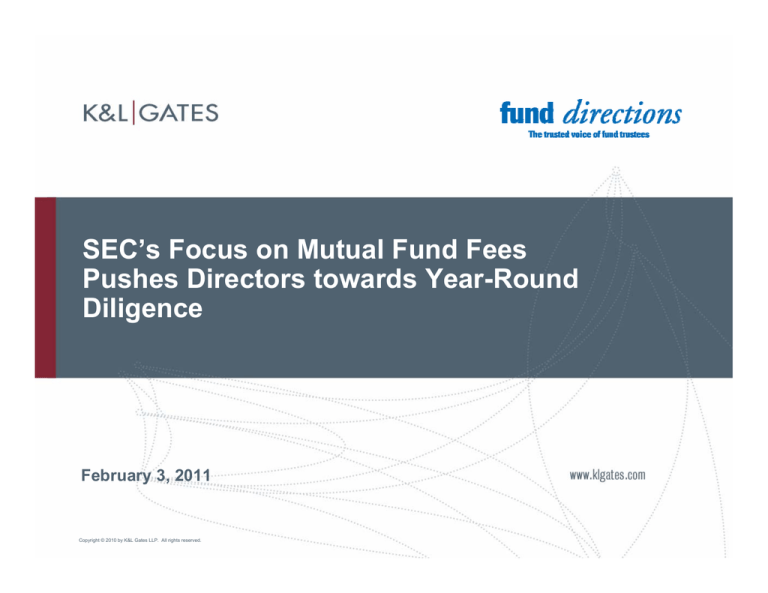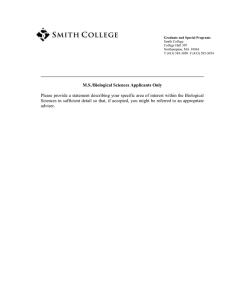
SEC’s Focus on Mutual Fund Fees
Pushes Directors towards Year-Round
Diligence
February 3, 2011
Copyright © 2010 by K&L Gates LLP. All rights reserved.
Moderator:
Melissa Karsh, Managing Editor of Fund Directions, a leading news
service for independent fund directors at mutual fund companies.
Panelists:
Paul H. Dykstra, Partner at K&L Gates in Chicago, represents mutual
funds or their boards throughout the U.S. He also counsels
independent fund directors involved in corporate reorganizations and
internal or SEC investigations.
Sam Freedman, Independent Trustee and Chairman of the Review
Committee for Oppenheimer Funds (Denver Board).
Roger B. Vincent, Independent Chairman of the Board of Directors for
various ING Funds.
Robert J. Zutz, Partner at K&L Gates in Washington, D.C., represents
investment companies, their independent directors and trustees,
investment advisers and broker-dealers throughout the U.S.
1
Establishment of SEC Enforcement Unit
Focused on Investment Management Matters
The SEC Division of Enforcement has established a special
unit designated to pursue enforcement investigations and
actions relating to investment management matters.
This unit has a staff of more than 60 persons, most of whom
are attorneys, plus investment management experts recruited
from private industry.
The unit will work closely with other SEC offices, including
the Division of Investment Management, OCIE and the
new Division of Risk, Strategy, and Financial Innovation.
2
Areas of Specific Focus by this New SEC
Enforcement Unit
Adequate disclosures relating to strategies, performance,
valuation and risk matters
The discharge by boards of their duties, especially relating to
their oversight of valuation and fees
Director independence issues
Personal trading activities
3
A Recently Announced Focus on Advisory
Contract and Fee Reviews by Investment
Company Boards
“The Asset Management Unit also has established a
Mutual Fund Fee Initiative to develop analytics, along
with other SEC Divisions, for inquiries into the extent to
which mutual fund advisers charge retail investors
excessive fees. These analytics are expected to result
in examinations and investigations of investment
advisers and their boards of directors concerning duties
under the Investment Company Act.”
4
Prior SEC Enforcement Action: The Case
Against BISYS Fund Services, Inc.
A 2006 case that was substantially premised on the adequacy
of disclosures made by a mutual fund service provider to the
Boards of various clients relating to fee arrangements.
This case was a substantial factor in causing many boards to
begin to apply more rigorous Section 15(c)-type reviews and
analyses with respect to contract and fee arrangements with key
service providers that - unlike advisers, subadvisers and
distributors - are not subject to Section 15(c) standards.
Note that, under some circumstances, Section 36 liability can
apply to these types of non-Section 15(c) service providers.
5
Prior SEC Enforcement Action: The Case
Against New York Life Investment
Management, LLC
A 2009 enforcement case based primarily on the alleged failure
of an adviser to provide a mutual fund board with fairly granular
information relating to investment adviser contract renewal
matters.
The first instance in recent memory in which the SEC used an
enforcement action to address Section 15(c) compliance
matters.
While this case was brought against the fund’s adviser, there is
a potential risk for similar actions involving independent board
members.
6
Section 36 Litigation Decision Involving
American Funds
The December 2009 American Funds Section 36 litigation
decision – which is still under appeal – raises important issues,
even in the post-Jones v. Harris world
The U.S. District Court judge criticized practically all parties
involved – the adviser, the independent trustees and legal
counsel for all parties – for not providing and/or seeking
additional information relating to the board’s analysis of
profitability under the Gartenberg standard
The judge also was critical of what he described as a “check the
box” approach. Did he simply add another box to check?
7
Key Decision-Making Processes
Be fully informed
Engage in a deliberative process
Apply any special expertise you might have
Appropriately document the foregoing actions
8
9
Possible Reasons for the SEC’s Renewed Emphasis
on Director Oversight of the 15(c) Process
• A newly aggressive SEC as a result of the Madoff
debacle and the perceived lack of oversight of financial
institutions during the financial crisis
• Stricter regulation of financial markets mandated by
Dodd-Frank (though, so far, without commensurate
additional funding of the SEC)
• The fund industry, with aggregate assets of $12 trillion,
is seen as warranting enhanced regulatory scrutiny
• During the oral argument in Jones v. Harris, the
Government lawyer conceded that the SEC hasn’t
brought a claim under Section 36(b) since 1980
10
The Holding in Jones v. Harris
The Jones Court unanimously held that Gartenberg
was correct: “to face liability under Section 36(b), an
investment adviser must charge a fee that is so
disproportionately large that it bears no reasonable
relationship to the services rendered and could not
have been the product of arm’s length bargaining.”
11
Gartenberg in Perspective
Since Gartenberg, no plaintiff has succeeded
in winning any damages in an adjudicated
case. There have been settlements but no
victories in court.
12
On the Role of Independent Directors
• The Jones opinion appears to be a major
affirmation of the crucial role of informed and
diligent fund directors in overseeing fees and
monitoring conflicts of interest.
• The Court reiterated that “scrutiny of investment
adviser compensation by a fully informed fund
board is the cornerstone of the effort to control
conflicts of interest within mutual funds.”
• Directors are the “independent watchdogs” of the
relationship between a mutual fund and its adviser.
13
On Judicial Review of Fund Board Decisions
• The Jones Court stressed that, “where a board’s process
for reviewing investment adviser compensation is robust,
a reviewing court should afford commensurate
deference to the outcome of the bargaining process.
Thus, if the disinterested directors considered the
relevant factors, their decision to approve a particular fee
agreement is entitled to considerable weight, even if a
court might weigh the factors differently.”
• The Court stressed that “Section 36(b) does not call for
judicial second-guessing of informed board decisions.”
14
The SEC’s View of the Role of Judicial Review
of Fund Board Decisions
The admonition of Justice Alito against “judicial
second-guessing” apparently was not shared by the
SEC. The Brief of the U.S. Solicitor General and the
SEC in the Jones case argued that the “law of trusts
strongly supports the proposition that courts may
consider whether an investment adviser’s annual fee
is excessive, above and beyond determining that the
adviser made full disclosure to the board.”
15
A Federal Business Judgment Rule?
The Jones Court appears to have embraced a federal
version of the familiar business judgment rule
applicable to directors under state law: Where a
corporate director is informed, acts in good faith and is
independent of management, the decision of that
director will be sustained as a reasonable exercise of
business judgment. There is, in effect, a presumption
of the correctness of the board’s decision.
16
The Essential Three I’s in Fund Board DecisionMaking
Where the Fund board is
• Informed
• Involved
• Independent
its decision is entitled to “considerable weight” according to
Jones. This standard presumably applies to actions
brought not just by plaintiffs in civil suits, but by regulators,
including the SEC, as well.
17
Questions
18
Additional
Materials
17
Work closely with management of investment adviser
•
•
•
Meet with portfolio manager to seek an explanation of shortfall, including an in-depth review of portfolio holdings and strategies
Request a specific plan for improvement with a detailed timetable
Replace individual portfolio manager (shareholder approval not required)
Change fund’s investment objective or investment policies
•
•
Can make fund’s investment style more compatible with prevailing market conditions
Shareholder approval required for change in investment objective (if it is a “fundamental” policy) but usually not for change in investment policies
Merge with another fund (either affiliated or unaffiliated) with similar investment policies but superior investment performance
•
•
•
•
Eradicates the poor record of the merging fund
Preserves shareholder base while giving them a tax-free alternative
Can lower overall fund expenses
Usually requires approval by shareholders of the merging fund
Decrease advisory fee (“penalty box”)
•
•
Savings of 10 to 30 basis points, though, aren’t going to outweigh seriously sub par performance and may cause adviser to lose interest
Can be implemented without shareholder approval
Institute a performance fee
•
•
•
•
•
Normally requires shareholder approval
Closely scrutinized by SEC
Fee must increase or decrease equally with fund performance as compared to the relevant benchmark (“fulcrum fee”)
Because it takes a long period to become meaningful, a performance fee is not an expeditious antidote to poor performance
The adviser, as a practical matter, is already subject to a performance fee, since it’s likely that redemptions will accelerate during poor performance, thereby
reducing aggregate advisory fees
Implement a multi-manager framework
•
•
Obtain an order from the SEC authorizing additions or replacements of subadvisers by the board without further action by shareholders
Amend management agreement, which requires a one-time approval by shareholders, to allow for this
Hire a new, unaffiliated entity as adviser
•
•
Under Rule 15a-4, a new adviser can be installed by the fund board on an interim basis for up to 150 days pending shareholder approval
This can be a drastic and disruptive action, especially if the fund’s shares are marketed primarily through an affiliated distributor
Liquidate the fund
•
•
Depending on fund charter, this can sometimes be done without a shareholder vote
Because it’s a taxable transaction, it’s desirable to give shareholders significant advance notice so they can select among two calendar years in which to take their
losses or gains (so they can redeem before liquidation)
This is not an exhaustive list of options when considering underperformance nor is it a substitute for legal advice or individual analysis of a particular legal matter. Readers should not act without seeking professional legal
counsel. Transmission and receipt of this publication does not create an attorney-client relationship.



